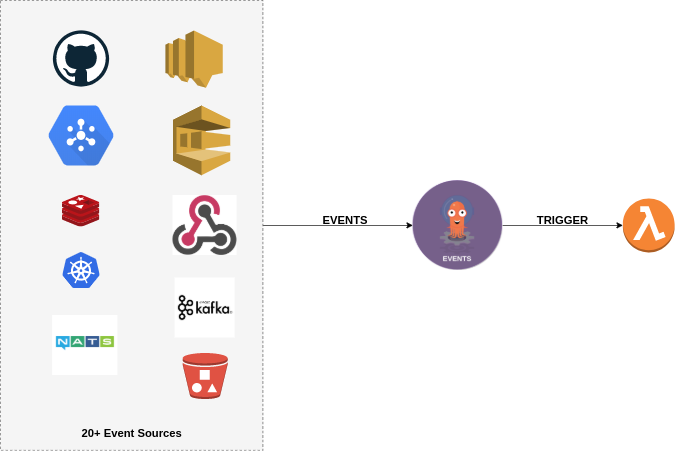AWS Lambda¶
AWS Lambda provides a tremendous value, but the event driven lambda invocation is limited to SNS, SQS and few other event sources. Argo Events makes it easy to integrate lambda with event sources that are not native to AWS.

Trigger A Simple Lambda¶
-
Make sure to have eventbus deployed in the namespace.
-
Make sure your AWS account has permissions to execute Lambda. More info on AWS permissions is available here.
-
Fetch your access and secret key for AWS account and base64 encode them.
-
Create a secret called
aws-secretas follows.apiVersion: v1 kind: Secret metadata: name: aws-secret type: Opaque data: accesskey: <base64-access-key> secretkey: <base64-secret-key> -
Create a basic lambda function called
helloeither using AWS cli or console.exports.handler = async (event, context) => { console.log('name =', event.name); return event.name; }; -
Let's set up webhook event-source to invoke the lambda over http requests.
kubectl apply -n argo-events -f https://raw.githubusercontent.com/argoproj/argo-events/stable/examples/event-sources/webhook.yaml -
Let's expose the webhook event-source using
port-forwardso that we can make a request to it.kubectl -n argo-events port-forward <name-of-event-source-pod> 12000:12000 -
Deploy the webhook sensor with AWS Lambda trigger.
kubectl apply -n argo-events -f https://raw.githubusercontent.com/argoproj/argo-events/stable/examples/sensors/aws-lambda-trigger.yaml -
Once the sensor pod is in running state, make a
curlrequest to webhook event-source pod,curl -d '{"name":"foo"}' -H "Content-Type: application/json" -X POST http://localhost:12000/example -
It will trigger the AWS Lambda function
hello. Look at the CloudWatch logs to verify.
Specification¶
The AWS Lambda trigger specification is available here.
Request Payload¶
Invoking the AWS Lambda without a request payload would not be very useful. The lambda trigger within a sensor
is invoked when sensor receives an event from the eventbus. In order to construct a request payload based on the event data, sensor offers
payload field as a part of the lambda trigger.
Let's examine a lambda trigger,
awsLambda:
functionName: hello
accessKey:
name: aws-secret
key: accesskey
secretKey:
name: aws-secret
key: secretkey
namespace: argo-events
region: us-east-1
payload:
- src:
dependencyName: test-dep
dataKey: body.name
dest: name
The payload contains the list of src which refers to the source event and dest which refers to destination key within result request payload.
The payload declared above will generate a request payload like below,
{
"name": "foo" // name field from event data
}
The above payload will be passed in the request to invoke the AWS lambda. You can add however many number of src and dest under payload.
Note: Take a look at Parameterization in order to understand how to extract particular key-value from event data.
Parameterization¶
Similar to other type of triggers, sensor offers parameterization for the AWS Lambda trigger. Parameterization is specially useful when you want to define a generic trigger template in the sensor and populate values like function name, payload values on the fly.
Consider a scenario where you don't want to hard-code the function name and let the event data populate it.
awsLambda:
functionName: hello // this will be replaced.
accessKey:
name: aws-secret
key: accesskey
secretKey:
name: aws-secret
key: secretkey
namespace: argo-events
region: us-east-1
payload:
- src:
dependencyName: test-dep
dataKey: body.message
dest: message
parameters:
- src:
dependencyName: test-dep
dataKey: body.function_name
dest: functionName
With parameters the sensor will replace the function name hello with the value of field function_name from event data.
You can learn more about trigger parameterization here.
Policy¶
Trigger policy helps you determine the status of the lambda invocation and decide whether to stop or continue sensor.
To determine whether the lambda was successful or not, Lambda trigger provides a Status policy.
The Status holds a list of response statuses that are considered valid.
awsLambda:
functionName: hello
accessKey:
name: aws-secret
key: accesskey
secretKey:
name: aws-secret
key: secretkey
namespace: argo-events
region: us-east-1
payload:
- src:
dependencyName: test-dep
dataKey: body.message
dest: message
policy:
status:
allow:
- 200
- 201
The above lambda trigger will be treated successful only if its invocation returns with either 200 or 201 status.